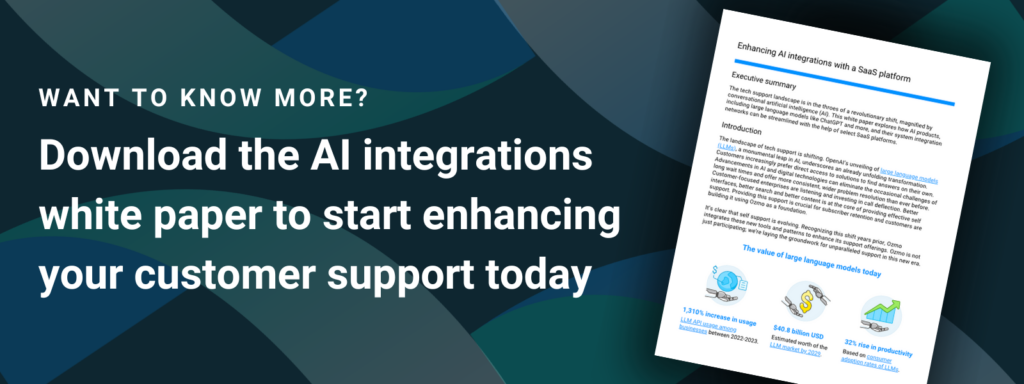They’re seemingly everywhere: endless headlines claiming that AI is nothing but trouble.
Recent stories claim that AI will steal jobs or dehumanize customer service. This can hinder companies from adopting AI technology and reaping its many benefits.
But these claims simply aren’t true. In this post, we separate fact from fiction and go over the benefits of implementing AI into your customer support strategy.
Debunking the top AI myths
AI has the power to transform your business for the better, especially when it comes to customer service. Yet many misconceptions prevent companies from adopting the technology that could help their business. Below are a few common myths that persist about AI in customer service.
Myth one: AI will replace contact center agents
Many online articles and blogs claim that AI is coming for everyone’s job, especially for those of contact center agents. This couldn’t be further from the truth. AI can’t replace humans in your contact center.
Why? Well, many customers crave interactions with actual people. In fact, according to the National Customer Rage survey, the number one frustration among customers is the inability to speak with a human. Additionally, seven out of 10 customers prefer human agents when dealing with a service-related problem. That means employing real people is vital to improving the customer service experience.
However, AI can be a powerful tool to help improve contact agent performance. For example, you could use AI to enhance the agent onboarding experience, which is vital to reducing agent attrition and increasing employee engagement. A recent study showed that using AI can improve agent performance by 14%. So, while AI won’t replace human agents, it will help your agents do their jobs better.
Myth two: AI implementation is too complex and costly
Another common misconception is that AI implementation is very complex and expensive. However, AI implementation can be as simple as copying and pasting a few lines of code into the code on your website. This leads to minimal downtime and helps you get your AI solution up and running fast.
Additionally, there are many budget-friendly AI options companies can implement. You don’t need to completely overhaul your tech stack with AI tools. Instead, start small. For example, regional service providers looking to scale tech support might consider using conversational AI chatbots to answer customers’ frequently asked questions. You can then gradually incorporate other AI tools as your company’s needs grow.
Interested in learning more about AI?
Myth three: AI cannot provide personalized customer experiences
There are numerous advantages to providing personalized customer service, from improved customer satisfaction to increased profits. But there’s a pervasive myth that AI leads to generic, one-size-fits-all customer experiences. This often prevents companies from adopting AI technology that could create better customer self-service experiences.
AI can improve customer service by helping companies personalize customer experiences at scale. For example, the technology can analyze customer data to make product recommendations and help anticipate tech service issues before they arise.
Another powerful way AI can personalize customer service is by offering self-service resources in the customer’s preferred language. For example, a customer in Montréal might prefer viewing interactive tutorials in French instead of English. AI can help you personalize the customer service experience for everyone, whether you’re serving thousands or millions of customers.
Myth four: AI customer support is only suitable for large enterprises
Another common misconception is that AI is only beneficial for large businesses with substantial resources and a generous budget. However, many small business owners use AI every day to manage their company's day-to-day operations.
In fact, a survey found that 80% of small business owners who used AI found it helpful for managing their business operations. Over half of those business owners also said it helped them grow their business.
Adopting AI tools doesn't have to be only for big businesses. Small, regional service providers can benefit from these tools, too. AI can help you scale support and improve the customer service experience. When you consider that 96% of customers leave after one bad service experience, AI is too powerful a tool to ignore.
Myth five: AI is static and never improves
Some people believe that once an AI solution is implemented, it stays exactly the same. But the truth is that AI is constantly evolving. Through machine learning algorithms, AI technology can learn and improve.
For example, as an AI customer service solution analyzes customer data, it can better assist customers in navigating self-service or coach agents on appropriate responses to customer inquiries. Just as your personal devices update multiple times a year with software improvements, so does AI.
Myth six: My telecom or broadband business doesn’t need AI
AI is no longer a nice-to-have but a must-have for businesses looking to improve their customer service. More than three-fourths of customers are frustrated by a lack of personalized company interactions.
But if you have millions of customers, how do you ensure you create a tailored service experience for everyone? That’s where AI comes in. Using AI to create personalized service experiences can reduce customer churn.
AI can also be used to provide timely responses. Research shows customers expect you to respond within five minutes or less. But there’s no way even the best contact center agents could do that for thousands or millions of customers. Again, AI technology like self-service tutorials or chatbots can ensure your customers can get answers to their pressing questions instantly.
The takeaway? AI is becoming an integral part of good customer service. Companies that adopt the technology can provide more effective support in ways they simply couldn’t before.
Myth seven: AI is brand new technology
Most people may think that the use of AI started when ChatGPT was introduced in 2022. But this couldn’t be further from the truth. The idea of AI has been around since the 1950s.
Alan Turing, the British Mathematician who broke the German code during World War II, is widely considered the father of AI. He developed the “Turing test,” which is still used in AI innovation today. The first known AI model was designed shortly afterward in 1956.
You might use AI in your everyday life without knowing it. Spell check, the facial recognition software on your phone and self-driving vehicles are all powered by AI technology
Separate fact from fiction when it comes to AI
There are a lot of misconceptions regarding using AI in contact centers. As a result, companies can be reluctant to adopt AI technology, even when it could greatly benefit their business. To separate myth from fact, make sure to read about AI from reliable sources and stay on top of industry-related AI trends.
AI is here to stay, and companies that learn how to leverage the technology can create better customer service experiences that stand out from the competition.

Are you looking to learn more about AI? Our recent whitepaper explains how popular AI models like ChatGPT and DALL-E can integrate with your customer service tools and improve tech support. Download your free copy today!



